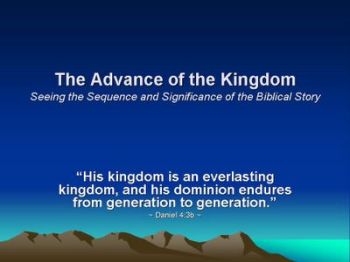Any thoughtful Christian has stumbled over the question, “Why did an all powerful God permit sin? Why does sin exist?”
Before I go on to “answer” that question, let me affirm that we humans have limited minds and limited abilities to grasp such “why” questions. Ultimately, God is the potter and can do what He wants. But there are some Biblically faithful answers to these questions.
The Standard Answer
The standard, or typical evangelical answer goes like this. God wanted to have people who truly loved Him. He wanted to share fellowship with created beings. He wanted this so much, he was willing to risk the presence of sin to make us. He did not want to make mere robots, but creatures with a free will. So although God knew sin was going to happen, and He knew sin would have devastating effects on His creation, He was willing to allow it in order to have some people love him freely. He died to save as many as would come. God wants all to come and desires all to be saved, but knows that only some will. And he is happy with all who come and share fellowship with Him. He works all things for the good of His people, because He loves them above all things.
I think this is a pretty good answer, really. Yet there are problems. First, it presents God as limited. Sure the limitations are self-imposed, but the picture we get is that God is frustrated that not all are saved, and that many reject His offer of salvation. Second, it presents God as needy. God wanted fellowship so much, he permitted sin to get it. That makes it seem like God was not totally self sufficient. Given God’s infinitely glorious attributes, why would He really need a creation? Third, it prsents God as loving man above all. God does everything he can to save man. God wants to do everything for man. These views sound right to me, a man. But does God really operate in such a man-serving manner? Is God all about us? Is God man-centered?
A Better Answer
I propose a different answer, but one that is Scripturally sound, I trust. God was totally self-sufficient in the Trinity. He experienced total joy due to an absolute knowledge of all of His infinite perfections. This knowledge produced a great approval of and love for Himself. God loved His own image as represented in His Son’s face. The Holy Spirit participated in this love and joy. (I refer you to Jonathan Edward’s view of the Trinity, here.) In short, God was completely happy to be God, all by Himself: no creation needed.
But since God was experiencing great joy, He wanted to experience even more. And joy increases in the spreading. So God hatched a glorious plan. God would create in order to display His glory, and reveal knowledge about His infinite perfections. This knowledge would lead his chosen people to share in His joy in Himself and cause them to love God.
But intimately connected to his plan was the importance of knowledge. God had to spread a true and correct knowledge of Himself in order for others to really love and find joy in Him. This desire to spread knowledge was definitely proud and self-serving. God wants His own praise to be trumpeted! (Just scan through Isaiah 40-49, for proof.) And who else should God be proud about? To be proud in anything that is not the ultimate best there is, is sin. But God is the ultimate best. So God is selfish and that is okay. But this knowledge also necessitated the existence of sin. Without sin God could not reveal his attributes of love and mercy and longsuffering, and holiness and wrath against sin. There had to be a black backdrop against which the brightness of God’s glory could shine.
So God permitted sin. But He created a world where God is not held responsible for sin. Man is. Satan is. Not God. God is good. But God is the creator and everyone else isn’t. In God’s world, no one is punished unjustly. People all sin (after Adam’s fall, which God knew and foreordained would happen), and they do so willingly. But in this world, God steps in and reveals Himself and saves a people for Himself. God chose these people before He created the world, so God is not frustrated that others besides them are not saved. God finds joy in them, and God’s praise and glory is increased through their sharing in His joy. God gets gloy by being the provider and sustainer of their life, their redemption, and their eternal joy and satisfaction in Him. And this is truly loving to them. He does not serve their selfish interests, but provides what will truly satisfy them–Himself as the Eternal Good they need. And he works things for thier good to show that He is truly good, and to prove His own glorious faithfulness.
Now, some might object to this answer. It makes God unloving to some, they might say. And I am aware there are questions and difficutlites presented here. However, I think the objections raised to the previous answer are just as big and actually bigger. And, most importantly, I think the Bible supports this second answer. It may not be exactly what I as a man (dedicated to my own interests naturally, as the case is with us all) might desire, but it is what God’s Word teaches. Consider Acts 4:27-28 as proof that God holds creatures responsible for their sin, even when God was the One who foreordained that sin to happen, and used it for His ends. And then consider these verses from Romans which capture the heart of this second answer:
You will say to me then, “Why does he still find fault? For who can resist his will?” But who are you, O man, to answer back to God? Will what is molded say to its molder, “Why have you made me like this?” Has the potter no right over the clay, to make out of the same lump one vessel for honored use and another for dishonorable use? What if God, desiring to show his wrath and to make known his power, has endured with much patience vessels of wrath prepared for destruction, in order to make known the riches of his glory for vessels of mercy, which he has prepared beforehand for glory– even us whom he has called, not from the Jews only but also from the Gentiles? (Romans 9:19-24)
Before I close, I should encourage you to go check out William Dudding’s thoughts on this problem, as his post sparked mine. Also see Jonathan Edwards’ “On the End for which God Created the World”.
So, what do you think? Or have you thought about this issue? Please join the discussion.
Update: this post by Justin Taylor provides quotes by John Newton dealing with why God allows sin in the lives of believers. It is an edifying read, and I thought I’d add it here, since it relates to this topic.

